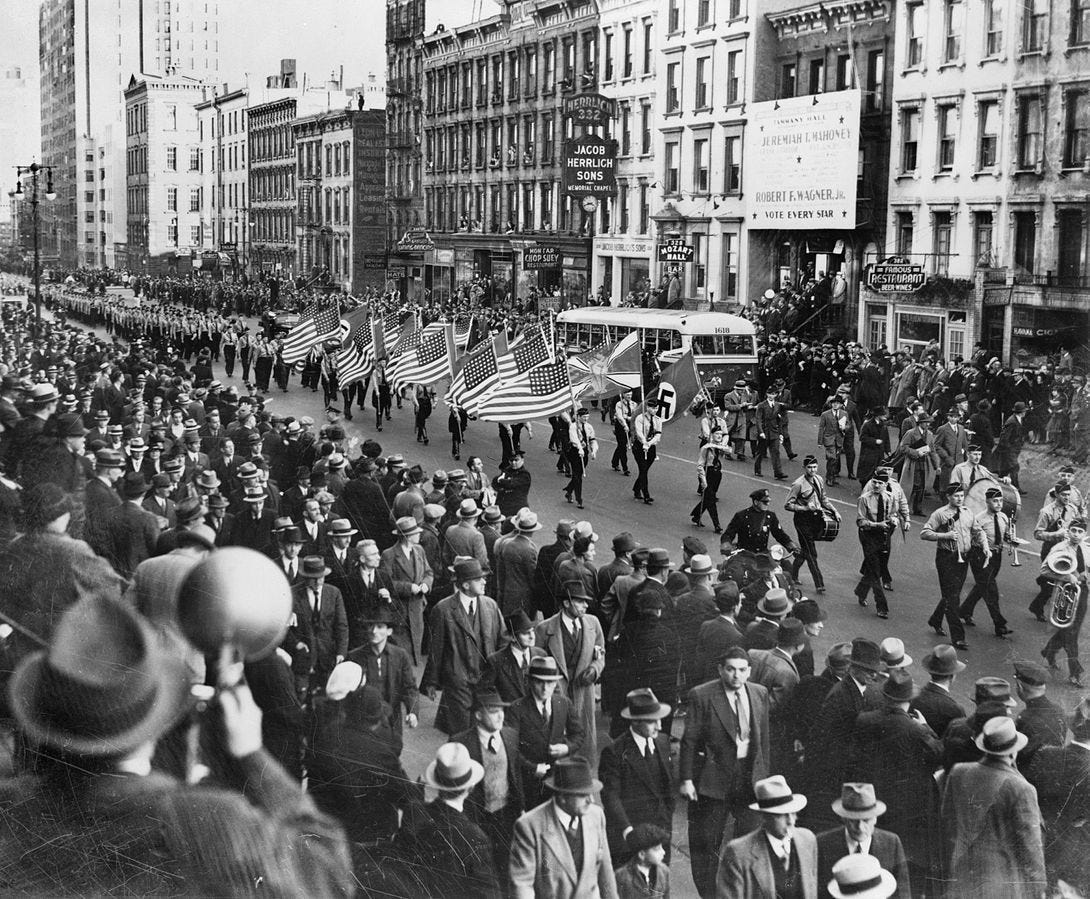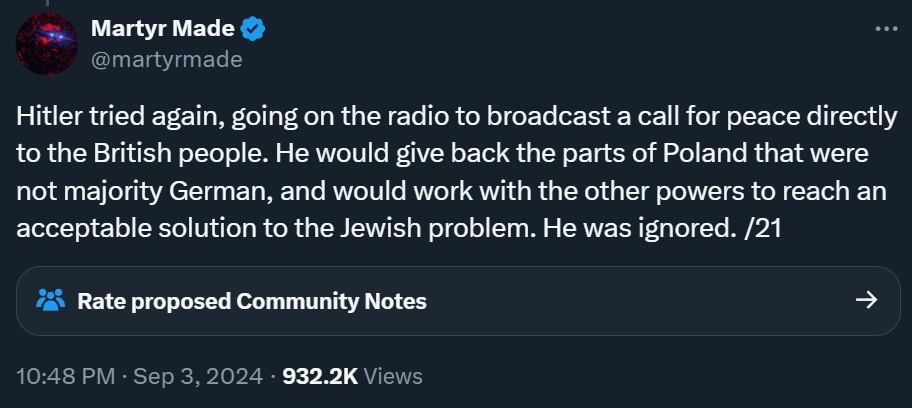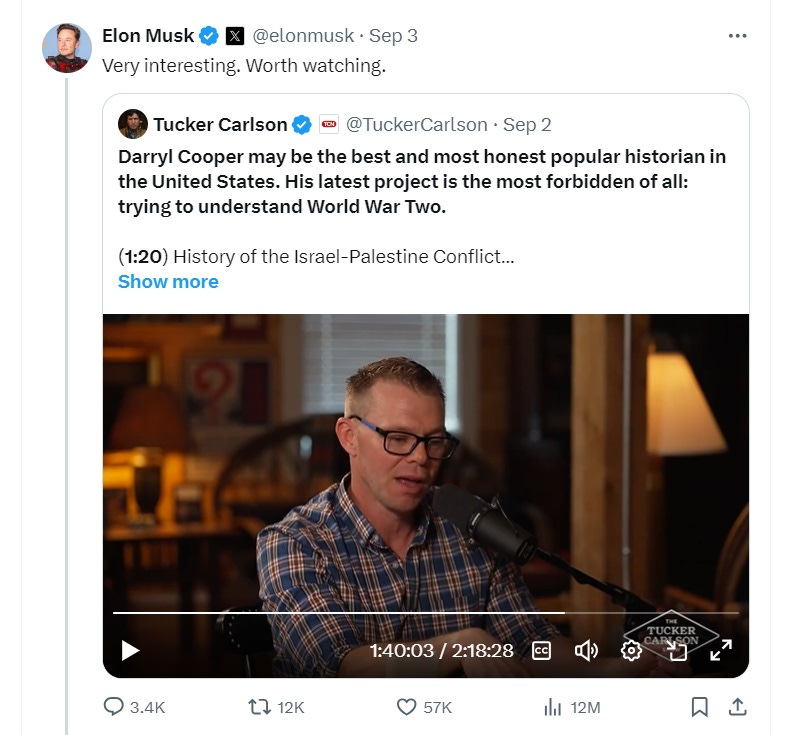How do you deal with real, actual Nazis?
They come back every few decades, spreading the same old lies.
“We are told the American soldier does not know what he is fighting for. Now, at least he knows what he is fighting against.” — Dwight D. Eisenhower, after visiting Buchenwald
Conservative friends of mine are fond of telling me that the number of “real, actual Nazis” in America is tiny. And that’s probably true! But America’s small number of Nazi sympathizers wax and wane in terms of their elite influence and visibility. In the 1970s there were some fairly prominent Nazi demonstrations in America (parodied by a scene in the movie Blues Brothers). In 1939, when the original Nazis still walked the Earth, an organization called the German American Bund (pictured above) held a huge rally at Madison Square Garden in support of Adolf Hitler.
In recent years, real actual Nazis of the swastika-waving variety have popped up once again, most famously at the Charlottesville protest in 2017.1 Now, apologetics for Hitler’s vanished regime have made their way back into the national discourse, thanks to media personality Tucker Carlson. In a recent interview on X (formerly Twitter), Carlson talked to amateur historian and podcaster Darryl Cooper, who is famous for his support for Adolf Hitler and for Germany’s actions during World War 2. In the interview, Cooper asserted that Winston Churchill, rather than Hitler, was the chief villain of WW2, and argued that the Holocaust was an accidental result of poor logistics rather than a deliberate campaign of extermination.
This was actually tame and mild stuff compared to Cooper’s usual fare. He has tweeted, from his account @martyrmade, about the “Jewish Problem” in Nazi Germany:
And here’s what he tweeted (and later deleted) in response to the appearance of some odd and colorful characters at the Olympic opening ceremonies in France this year:
In 2023, he tweeted that rule by Hitler and Mussolini was preferable to civil war, declaring that “a thousand years of tyranny is preferable to a single day of anarchy”. This July, he tweeted that Hitler had gone to Heaven rather than to Hell.
And so on. Darryl Cooper is what my conservative friends would call a “real, actual Nazi” — a support of, and apologist for, Adolf Hitler. Tucker Carlson offered little pushback in the interview, and called Cooper “the best and most honest popular historian in the United States”. Elon Musk, who has worked hard to promote Carlson’s show, called the interview “very interesting”, and suggested that people watch it, before later deleting his tweet:
Most conservatives, however, didn’t share Elon’s approving reaction; instead, they were aghast. Erick Erickson’s reaction was pretty typical:
Erickson shouldn’t really have been surprised. Tucker had been trending in this direction for many years. Here’s an image from Tucker’s show in 2017:
And the rest of his body of work didn’t exactly make it hard to predict he would go in this direction.
Erickson’s surprise might be frustrating, but it’s also natural. Pundits don’t tend to dig up the unsavory bits of other pundits’ work when they perceive those others to be on their team. Oppo research is for the opposition. But what Erickson’s shocked reaction does demonstrate is that the conservative movement has less natural immunity to Nazis than liberals or progressives do. Because Nazis style themselves as being on the generalized political Right, there is less political pressure for conservatives to seek out and vilify those on the Right who sympathize with the Nazi worldview.
Note that there is somewhat of a symmetry here with communists and anarchists in the progressive movement. Conservatives tend to seek out any whiff of radical leftism among Democrats or progressive activists, but progressives themselves don’t see the need to spend as much of their time doing so. Thus you saw occasional Stalin apologetics among the liberals of the mid-20th century, and today there are probably a few progressive figures who harbor quiet sympathies with the likes of Hugo Chavez. Certainly you have some extremists who try to associate themselves with the political Left, such as Students for Justice in Palestine:
But it would be a mistake to say that both sides are equivalent here. The Democrats’ antibodies to the communist, anarchist, and Islamist movements are perhaps not as strong as they should be, but they’ve proven to be much stronger than the Republicans’ antibodies to the real, actual Nazis. Palestine protesters were entirely shut out of the Democratic National Convention, and the protests fizzled. It seems unlikely that Carlson will receive any such censure or marginalization from the GOP. (I’m eager to eat my words on that, of course, but I’m highly pessimistic.)
Conservatives obviously need to step it up and expunge the real, actual Nazis from their movement and their party. But there’s also the question of how liberals and progressives should deal with the latest resurgence of real, actual Nazism in America.
Many people will respond: “Just punch the Nazis!” And in fact, vigorous and sometimes violent counter-demonstrations have accompanied every Nazi street action in America. Protesters physically fought against the Bund Nazis in 1939, against the Nazi rallies in the 70s, and against the Charlottesville marchers and other alt-right events in 2017. But this approach doesn’t work in the intellectual sphere — if you walk up and punch Tucker Carlson, you will be jailed for assault.2 Intellectual Nazis must be answered in the realm of public opinion, rather than in the streets.
One key element of the liberal and progressive response to Nazism should be to avoid conflating conservatives in general with Nazis. This became a big problem in the 2010s, when it became fashionable among some young online progressives to call anyone on the Right a “Nazi”. Online spaces trend toward extreme language like this, simply because there’s not much of a disincentive for flinging hyperbolic accusations. It takes no effort to call an anti-Nazi conservative like Erick Erickson a “literal Nazi”, and you’re unlikely to suffer any negative consequences from doing so. So lots of people did stuff like this, especially on Twitter.
I see two negative consequences to this approach. First, when the real actual Nazis come around, there will be no room for escalation in progressive rhetoric. If you’ve just spent five years calling every Republican a “literal Nazi”, what are you going to call a guy like Darryl Cooper? In some sense, over-application of the term “Nazi” is like crying wolf — now the actual wolf is here, and people are inured to the warnings. (This can be seen with the way Republicans have overused the “communist” insult against Democrats; no one even bats an eye anymore, it’s just table stakes at this point.)
Second, conservatives are generally going to get mad at being called “Nazis”. I certainly would, if I were them. This will make them less likely to hunt down and expel the actual Nazis lurking in their own movement. Negative polarization is the most powerful force in politics. Liberals and progressives obviously don’t agree with conservatives on much, and they may even despise them, but at the end of the day we all need to come together to defeat the totalitarians of the world.
Obviously, the people most zealously flinging the word “Nazi” at normie conservatives are mostly anonymous teenagers, foreign trolls, and other bottom-feeders. Prominent progressives and Democratic politicians can’t exactly police what those people say. But they should periodically speak up and say, publicly, that the vast majority of Republicans and conservatives are anti-Nazi. This will preserve rhetorical space to go after the real Nazis, as well as reassuring conservatives that their political opponents do not conflate them with Nazis. (For their part, conservatives should understand that the people calling them “Nazis” might be Chinese or Russian bots, programmed to sow dissent in American politics, and temper their reactions accordingly.)
Liberals and progressives should also have a nuanced understanding of the spectrum of beliefs on the Right. Some conservatives are afraid that immigrants from non-European countries will have cultures incompatible with traditional American culture. This fear is probably almost always unfounded, in my opinion. And if taken to an extreme level, it’s certainly compatible with the Nazi worldview. But most conservatives who feel this apprehension about immigrants from Latin America or Asia don’t take it to an extreme level — it makes them wary about immigration, but they would never dream of sending people to camps or making them wear armbands or whatever. When push comes to shove, I doubt that most conservatives will even support the kind of mass deportation campaign that Trump is proposing, despite the precedents from 20th century history.
In my opinion, liberals and progressives shouldn’t endorse right-wing xenophobia, or keep quiet about it. They should argue vigorously against it, and try to persuade right-wingers to change their minds. But they should also understand that this sentiment exists on a spectrum, and that unease about immigration is not the same as Nazism. When push comes to shove, people who want to dramatically reduce immigration can still make valuable allies against the Nazis — indeed, this is exactly what happened in World War 2.
Finally, liberals should use the periodic recrudescence of Nazism to educate the public about the actual history of WW2. Nazi historical claims like Daryl Cooper’s are rarely hard to refute — for example, Cooper blames Churchill for provoking the Nazi invasion of West Europe, even though that invasion began before Churchill even took power. There’s copious evidence that Hitler and the Nazi leadership planned the Holocaust in advance — it is undoubtedly the most well-documented genocide in human history.
These facts should not simply be regarded as “settled science”, to be stored in the depths of dry tomes and archival internet sources. Liberals should not sigh and roll their eyes and say “It’s not my job to educate you.” Each new generation is born not understanding the true scope of the horrors the Nazi regime committed, and few people really pay attention in their high school classes. No matter how onerous it is, history must be taught and re-taught if it’s going to continue to have an impact on how we deal with the problems of the present.
The thing about the Nazis is that they always lose in the end — their ideology demands continuous aggression, meaning that eventually they run into a coalition of opponents that overwhelms them. The only question is how long that takes. If the opponents of the Nazis are too politically divided — too focused on throttling and destroying each other — it’ll take longer to assemble the requisite anti-Nazi coalition, and the Nazis will make more headway and cause more havoc.
Donald Trump famously declared that there had been some “very fine people” among the Charlottesville protesters; let us give him the benefit of the doubt and assume that he did not mean to include the swastika-waving people in this group.
I do have a friend — a physicist and comedy club owner in San Francisco — who once shouted some profanity at Carlson when he saw him on the street. While undoubtedly emotionally satisfying, this approach is unlikely to result in a major curtailment of Nazism in America, no matter how vigorously or how often it is applied.









It helps to stock up on lightweight concepts for the less-than-Nazi versions of the things you don't like.
For example, "xenophobia" vs. "demographic anxiety." It's pretty normal for people to feel some anxiety when their neighborhood is gentrified, or when they become a minority in their town and lose certain network goods. That doesn't mean they hate the newcomers.
Of course, they might *also* hate the newcomers. "Poisoning the blood" etc. -- but this is something far more sinister than wanting neighbors who speak your language.
I was thoroughly disgusted with the interview which I listened to in part. Darryl’s claim that “challenging the official narrative is illegal in Europe” is particularly deplorable. What he’s referring to, undoubtedly, is Holocaust Denial. And yes: Holocaust Denial is bad Darryl! And the fact you don’t say that out loud is because you KNOW it’s bad and don’t want to defend it.
Most people, I would guess, won’t catch that part. But it was so clearly there I cringed with rage.
Carlson was always a bottom feeder but this is a new level of deplorable